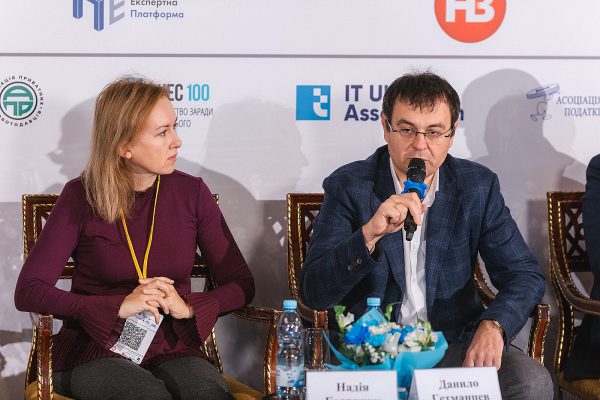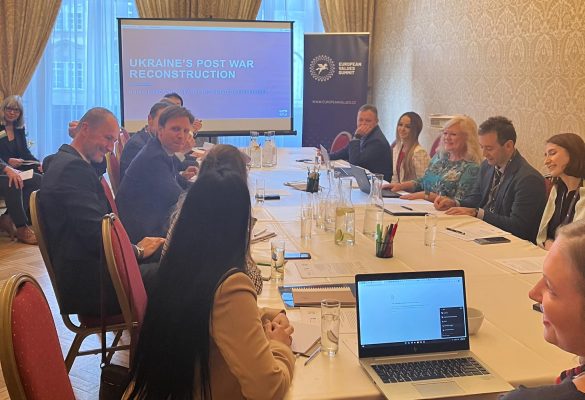Amid continued Russian attacks, Ukraine’s private sector is a driving force behind the country’s war efforts and visions for reconstruction, providing vital services and leadership during these critical moments. Leveraging their expertise and know-how will be key to rebuilding and driving reforms that ensure a clear break from the past and put Ukraine on a path to modernization.
Some of the country’s top private sector leaders spoke at a recent CIPE event to explain the crucial roles Ukrainian businesses are playing in daily life and why there is a sense of urgency to push for change now amid war. The event is one of many briefings and reports facilitated by CIPE at the request of organizations seeking ways to support Ukraine. Featured speakers included Kateryna Glazkova from the Union of Ukrainian Entrepreneurs, Andrii Dykun from the Ukrainian Agrarian Council, and Nadiia Bedrychuk from the Ukrainian Direct Selling Association.

They are among CIPE’s large and longtime network of partners inside Ukraine. Collectively they represent more than 200 business associations and over 40,000 small and medium sized enterprises (SMEs) from nearly ever sector and region in Ukraine.
Business Steps In
 Their stories are both moving and motivational for those looking to help. SMEs are filling gaps in every possible way, from organizing humanitarian aid to fixing military equipment. This includes unprecedented levels of cooperation with the Ukrainian government and constant advocacy for better and faster ways to support communities amid continuing Russian attacks and shortages of just about everything.
Their stories are both moving and motivational for those looking to help. SMEs are filling gaps in every possible way, from organizing humanitarian aid to fixing military equipment. This includes unprecedented levels of cooperation with the Ukrainian government and constant advocacy for better and faster ways to support communities amid continuing Russian attacks and shortages of just about everything.
According to panelists, Ukrainian citizens are seeking ways to live with and look beyond the ongoing war and some key themes are emerging. Many center around the country’s obvious need and demand for transparency, reform, and modernization. And along with that, the private sector has an important message: As subject matter experts and essential parts of the economy, Ukrainian businesses must have an amplified voice in future planning and policymaking.
Transparency & Anti-Corruption
 The need for greater transparency, and more specifically anti-corruption measures, was a red thread throughout the entire event. With all speakers strongly supporting Ukraine’s strengthened commitment towards anti-corruption efforts due to scandals, and sharing additional recommendations, it is clear that this topic is the new zeitgeist in Ukraine. Corruption is now associated with a pro-Russian approach and other related and damaging phenomena, such as the rise of oligarchs and corrosive capital investments from the Kremlin that weakened Ukraine’s infrastructure ahead of military invasions.
The need for greater transparency, and more specifically anti-corruption measures, was a red thread throughout the entire event. With all speakers strongly supporting Ukraine’s strengthened commitment towards anti-corruption efforts due to scandals, and sharing additional recommendations, it is clear that this topic is the new zeitgeist in Ukraine. Corruption is now associated with a pro-Russian approach and other related and damaging phenomena, such as the rise of oligarchs and corrosive capital investments from the Kremlin that weakened Ukraine’s infrastructure ahead of military invasions.
“We are paying a high price, so the answer is zero tolerance (for corruption),” said Glazkova. She and the other speakers insist that anti-corruption measures and efficiencies must be implemented during what they view as a potentially narrow window of opportunity. If they do not take this rapid response approach, the country risks falling back into pre-war familiar patterns that no longer reflect the current societal makeup and business constituency that is committed to prioritizing integrity and ethics.
We are paying a high price, so the answer is zero tolerance.
The panel’s hope is that business and government can continue to act as cooperating partners, rather than revert to the sometimes adversarial relationships of the past. And businesses are getting more involved to make sure there is follow through from lawmakers.
Reform Right Now

Planned reform is never easy. It is nearly impossible in times of war. However, as explained at the event, many CIPE partners are pushing for and succeeding in getting measures adopted by the government. Some changes are even being expedited to help speed business operations necessary to supporting the war efforts.
“The road ahead isn’t easy, but the war can’t slow down the pace of reforms,” said Bedrychuk. Her organization is among the groups that pushed successfully for recent measures to require disclosures on food prices to Ukrainian troops. They are also urging changes to how economic crimes are investigated to eliminate conflict of interest among government officials.
The road ahead isn’t easy, but the war can’t slow down the pace of reforms.
Bedrychuk and the rest of the panel indicated that the bureaucratic streamlining must continue, and they have more ready examples of where the government should focus, including simplifying tax procedures and customs clearance processes, as well as digitizing all possible records for easier access and online public tracking.
Modernizing for a New Ukraine
 Critical to making all this happen is a need to modernize. Rebuilding is already taking place and it is the opportunity to step up to modern infrastructure and society. Digitization and a move to universal access are core to this idea. The belief among panelists is that, if the opportunity for decisive change is not seized now, the chance to build a new Ukraine won’t happen again, or at least not for a long time. More than anything, it was expressed as a motivation for current activities and a north star for what’s to come.
Critical to making all this happen is a need to modernize. Rebuilding is already taking place and it is the opportunity to step up to modern infrastructure and society. Digitization and a move to universal access are core to this idea. The belief among panelists is that, if the opportunity for decisive change is not seized now, the chance to build a new Ukraine won’t happen again, or at least not for a long time. More than anything, it was expressed as a motivation for current activities and a north star for what’s to come.
It is time not only to win the war, it’s time to change the country.
“Work done in this one year, has been more than in the past five years. It is time not only to win the war, it’s time to change the country,” noted Dykun. He and the other speakers view what’s taking place today as more than preparations for reconstruction. On every level – technological, infrastructural, ethical – the type of change taking place is one to create a new society altogether.
While some core values and beliefs remain, such as the will and resilience of the Ukrainian people, others that thwarted true reform and efforts to modernize are being pushed aside. Among the shifts: a change in views on the role of small and medium-sized enterprises, with their ingenuity and ability to deliver solutions and sacrifice amid the worst of crises. They are fixing everyday problems and pushing for changes to address them, including recovery from the current destruction that includes technology and changes that create “an opportunity for Ukrainian industry to leapfrog competitors tomorrow,” according to CIPE Chairman Greg Lebedev, who also spoke at the event.
Business Will Continue to Lead
 Much of the activity and productivity one sees in the news these days is connected somehow to on-the-ground SME action. For example, a member company of Glazkova’s association created a missile warning app for citizens that has helped save many lives. And new CIPE-supported studies indicate trust in business within their communities is at all-time high, according to Glazkova. Meanwhile, history tells us that it is the SMEs that shoulder much of the burden for rebuilding and realigning in post-conflict countries.
Much of the activity and productivity one sees in the news these days is connected somehow to on-the-ground SME action. For example, a member company of Glazkova’s association created a missile warning app for citizens that has helped save many lives. And new CIPE-supported studies indicate trust in business within their communities is at all-time high, according to Glazkova. Meanwhile, history tells us that it is the SMEs that shoulder much of the burden for rebuilding and realigning in post-conflict countries.
The voice of the local private sector is absolutely crucial for the success and sustainability of the rebuilding efforts.
CIPE Europe and Eurasia Director Natalia Otel Belan, who moderated the panel discussion, stresses that ownership by local stakeholders, including the local private sector, will be essential in the coming months and they have earned a seat at the table. “They not just looking to rebuild the old post-Soviet country, but rather transform Ukraine into a new, modern economy and state that ensures peace and prosperity to all of its citizens, and quickly becomes a contributor to global democracy and prosperity…” she said. “As we are learning from other reconstruction efforts, the robust ownership and voice of the local stakeholders, including the local private sector, is absolutely crucial for the success and sustainability of the rebuilding efforts.”
And they will need help and support in the months and years ahead. As one example, Dykun says landmines now litter many farm fields and most agriculture businesses are in need of new equipment and trucks, having donated theirs to the military. Many other SMEs that have managed to stay in business face similar hardships. “More and more folks want to pitch in and understandably don’t know quite how to do it,” said Lebedev.
“Ukraine’s strengths, such as its robust civil society, innovative business community, highly educated citizenry, and public systems ensuring transparency… all of these conditions make the country an attractive candidate for successful reconstruction efforts, but obviously there is a lot of work to do,” said Lebedev.
To help inform international audiences, including experts and donors, CIPE will continue to offer briefings with the Ukrainian business and analyses based on CIPE’s work in conflict zones over the past four decades. New content will include partner insights around challenges to reconstruction and repairing the economy, as well as updates on the priorities of Ukraine’s private sector heroes. Meanwhile, it is essential that the private sector play a leading role in efforts to assess needs and map the country’s future, as the contributions of business evolve and Ukraine prepares to grow.
| Some Private Sector Priorities for Change and Support: | |
|---|---|
|
|
Published Date: March 22, 2023
